

British English and American English. British English and American English British people and American people can always understand each other – but there are a few notable differences between British English and American English Grammar Americans use the present perfect tense less than speakers of British English and a British teacher might mark wrong some things that an American teacher would say are correct.

US Did you do your homework yet? Brit. In British English, ‘have got’ is often used for the possessive sense of ‘have’ and ‘have got to’ is informally used for ‘have to’. Brit. There are a number of other minor grammatical differences. Vocabulary There are a lot of examples of different words being used in British and American English. Angry (Brit.) = mad (US) autumn = fall boot (of a car) = trunk chemist’s = drug store cupboard = closet flat = apartment lift = elevator nappy = diaper pavement = sidewalk petrol = gas/gasoline rubbish = trash tap = faucet trousers = pants Spelling US theater, center Brit. theatre, centre.
Google Safety Center. As a parent or guardian, you know what feels right for your family and how your kids learn best.
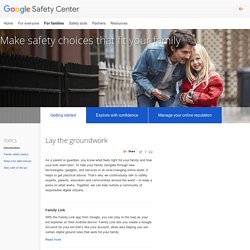
To help your family navigate through new technologies, gadgets, and services in an ever-changing online world, it helps to get practical advice. That’s why we continuously talk to safety experts, parents, educators and communities around the world – to keep a pulse on what works. Together, we can help nurture a community of responsible digital citizens. {*style:<ul>*} {*style:<li>*} {*style:<h3>*} Family Link {*style:</h3>*} {*style:<br>*} With the Family Link app from Google, you can stay in the loop as your kid explores on their Android device. Family Link lets you create a Google Account for your kid that’s like your account, while also helping you set certain digital ground rules that work for your family.
Digital Citizenship. Digital Dilemma Scenarios with Questions. Introducing Social Media to Elementary Students. Let me begin this post by saying, "I agree.
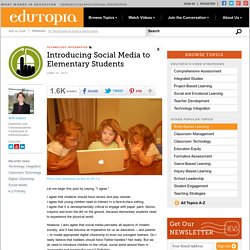
" I agree that students should have recess and play outside. I agree that young children need to interact in a face-to-face setting. I agree that it is developmentally critical to engage with paper, paint, blocks, crayons and even the dirt on the ground, because elementary students need to experience the physical world. However, I also agree that social media pervades all aspects of modern society, and it has become an imperative for us as educators -- and parents -- to model appropriate digital citizenship to even our youngest learners. Do I really believe that toddlers should have Twitter handles? Why? I have worked with and spoken to dozens of educators who strongly feel that engaging in social media is irrelevant for them because of their students' age.
Students already have enough screen time. If we honestly think about it, we were all taught the "social media" of our time in early elementary school. As I said, I agree. 1. 2. Social media guidelines. Student run genius bar. Edutopia mobile learning guide. Teaching digital citizenship across the whole curriculum. By Dennis Pierce September 15th, 2015 Teaching digital citizenship as a “one-off event” doesn’t lead to changes in behavior, experts say When author and IT director Mike Ribble talks about the importance of teaching students appropriate online behavior, he likes to share a few eye-opening statistics.
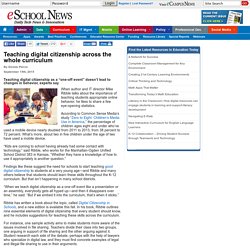
According to Common Sense Media’s study “Zero to Eight: Children’s Media Use in America,” the percentage of children ages eight and under who’ve used a mobile device nearly doubled from 2011 to 2013, from 38 percent to 72 percent. What’s more, about two in five children under the age of two have used a mobile device. “Kids are coming to school having already had some contact with technology,” said Ribble, who works for the Manhattan-Ogden Unified School District 383 in Kansas.
“When we teach digital citizenship as a one-off event like a presentation or an assembly, everybody gets all hyped up—and then it disappears over time,” he said. Managing an online identity. Digital Native vs Digital Citizen? Examining a Dangerous Stereotype. There are a lot of dangerous stereotypes out there.
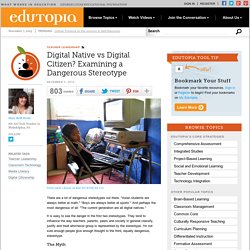
"Asian students are always better at math. " "Boys are always better at sports. " And perhaps the most dangerous of all: "The current generation are all digital natives. " It is easy to see the danger in the first two stereotypes. They tend to influence the way teachers, parents, peers and society in general classify, justify and treat whichever group is represented by the stereotype. The Myth There are many people I come in contact with on a regular basis who assume that any child under the age of 18, were they given a computer, would automatically know how to use it. How to Teach Internet Safety to Younger Elementary Students. A few years ago, I wrote a post called “Teaching Digital Citizenship in the Elementary Classroom.”
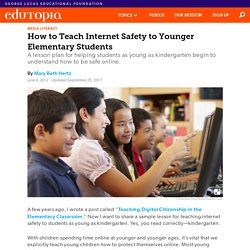
Now I want to share a sample lesson for teaching internet safety to students as young as kindergarten. Yes, you read correctly—kindergarten. With children spending time online at younger and younger ages, it’s vital that we explicitly teach young children how to protect themselves online. Most young children get the “stranger danger” talk at school, so they know about how to handle strangers in their neighborhood and in face-to-face situations. Digital Citizenship Week: 6 Resources for Educators. Considering how ubiquitous smartphones and tablets have become, especially in high school and middle school, questions about managing use and educating students about digital etiquette are on a lot of educators' minds.
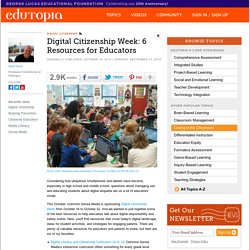
This October, Common Sense Media is sponsoring Digital Citizenship Week from October 16 to October 22. And we wanted to pull together some of the best resources to help educators talk about digital responsibility and safety online. Here, you'll find resources that cover today's digital landscape, ideas for student activities, and strategies for engaging parents. There are plenty of valuable resources for educators and parents to share, but here are six of my favorites: Digital Literacy and Citizenship Curriculum for K-12: Common Sense Media’s interactive curriculum offers something for every grade level. More Resources From Edutopia. GUARDIAN: My best citizenship lesson: using paper blogs to teach international digital citizens. Ofsted chief: reward good citizens who check why children are not at school.
Let's put citizenship at the heart of the new curriculum. Citizenship education as important as ever; new book for key stage 3 out today. Citizenship Foundation: 'British values' already have a place in the school curriculum. You told us the new Education Secretary should take citizenship more seriously. Citizenship Foundation: GCSE consultations launched - your response is invaluable! Citizenship Foundation: Job Vacancies. With your help, we can make the new citizenship GCSE even better « Democratic Life.